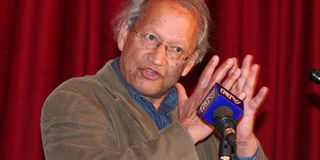Bomas law held key to peace, says Ghai

Prof Yash Pal Ghai. He said the proposed changes to security laws are a threat to the Constitution. FILE PHOTO |
The violence that rocked Kenya could have been avoided if the Bomas Draft constitution had been adopted in 2005, Prof Yash Pal Ghai said on Thursday.
The legal expert also called for the full implementation of the Waki report to avert similar crises in future.
He warned that implementing the report would jeopardise the country’s stability in the short-term. However, he said the long-term benefits were too important to be ignored.
Rights abuses
“We have suffered for so long under the current laws that condone human rights abuses, corruption and impunity... we cannot go on like this,” said Prof Ghai, who chaired the Constitution of Kenya Review Commission that led the review process, which culminated in the November, 2005 referendum.
According to Prof Ghai, the recommendations made by the Waki and Kriegler reports were similar to the proposals in the Bomas draft.
The Kriegler report was compiled after investigations into the disputed presidential elections, which were partly blamed for the post-election violence.
Speaking at the annual Ethics Conference at Nairobi’s Strathmore University, Prof Ghai endorsed the Waki report saying it had a systematic way of solving the country’s problems.
However, the constitutional lawyer is likely to be criticised by politicians who have already said that those behind the post-election violence should be pardoned.
Even as he spoke, ODM leaders rejected the report when they met in Nairobi on Thursday.
“Of course forgiveness is important,” Prof Ghai said, “but it cannot come before the perpetrators confess.”
Special tribunal
He particularly welcomed the proposal to set up a special tribunal to try the suspects. According to him, this was the best way to achieve accountability for the crimes committed early this year.
If the tribunal is not formed, a list of the perpetrators will be presented to the International Criminal Court in The Hague, which is expected to try the suspects.
“Both processes will ensure justice is achieved... some people have to be dealt with,” Prof Ghai said.




